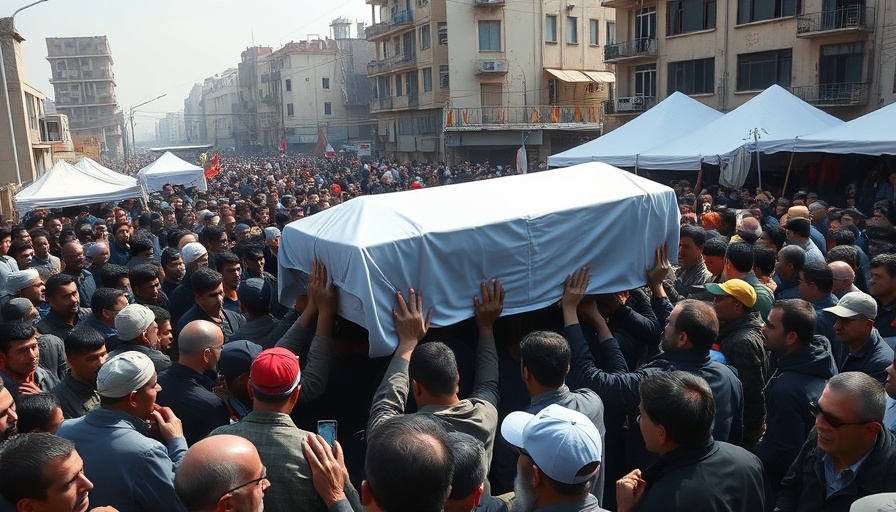
Uncovering the Tragedy: Autopsies Reveal Shocking Details
The recent autopsies of Gaza medics killed in an Israeli strike have unveiled heartbreaking details of their deaths, marked by gunshots that primarily struck their heads and chests. A total of 15 lives were lost during this tragic incident on March 23, where paramedics and emergency services were attacked while responding to urgent situations on the ground in Southern Gaza. The graphic nature of these findings evokes a profound need for accountability and transparency in conflict zones.
The Context of the Attack: Understanding the Incident
The attack involved ambulances and a fire truck belonging to the Palestine Red Crescent Society and the Civil Defense. Witness accounts, as well as video and audio recordings, confirm that Israeli troops actively fired on these emergency vehicles. Israel later confirmed its responsibility for the strike, claiming that they acted under the belief that some of the deceased were Hamas operatives, a stance that has drawn heavy criticism and skepticism from various experts and observers.
The Aftermath: Investigating Possible War Crimes
In the wake of the attacks, international condemnation has surged, with experts labeling the incident a potential war crime. Such allegations underscore the complexities involved in identifying combatants versus non-combatants in conflict scenarios, especially when emergency personnel are directly harmed. Questions surrounding the conduct of Israeli forces and the rules of engagement further highlight the moral and ethical dilemmas present in warfare.
Expert Analysis: Insights from Forensic Pathology
Dr. Ahmad Dhair, who led the autopsies, conducted examinations between April 1 and April 5, providing critical forensic evidence in this highly charged atmosphere. His collaboration with Dr. Arne Stray-Pedersen from Oslo University Hospital enhanced the investigation's credibility. Their analysis helps synthesize the medical insights needed to support calls for justice in this horrific episode.
Global Reactions: Amplifying Voices for Accountability
This tragic event has sparked a wider discourse on the treatment of medics during armed conflict. Organizations worldwide are emphasizing the need for protective measures to ensure that medical and emergency personnel can operate safely in crisis zones. The outcry extends beyond Gaza, calling for systemic changes that could prevent such incidences in the future.
A Broader Perspective: The Role of Media in Conflict Reporting
Reporting on conflicts like the situation in Gaza is fraught with challenges, as journalists work to maintain accuracy while also conveying the human cost of violence. The New York Times’ dedicated reporting exemplifies a commitment to uncovering the truth, revealing the stories of those affected and fostering international dialogue. This role puts pressure on both governments and organizations to act responsibly and transparently.
What We Can Do: Spreading Awareness and Mandating Action
Understanding the gravity of these events allows readers to advocate for change. Individuals can support humanitarian organizations working on the ground or raise awareness through social media platforms, amplifying the voices of those suffering due to violence. Awareness is the first step toward holding powers accountable for their actions and urging them to reconsider their strategies.
Connecting with the Topic: How Do We Feel?
For many who hear about such incidents, emotions run deep. Feelings of anger, confusion, and helplessness often take center stage. The dynamics of war juxtaposed with the welfare of innocent lives compel people to reflect on what it means to be human. Acknowledging these emotions can lead to constructive conversations about peace and methods to enhance protections for humanitarian workers.
In conclusion: The autopsy findings related to the slain Gaza medics create a stirring narrative that needs to be addressed. As members of a global society, it's essential to keep the pressure on authorities, promote accountability, and ensure that such tragedies either do not occur or are drastically reduced in frequency. Seeking justice for those lost and improving mechanisms for safety should be part and parcel of our collective efforts. We must continue advocating for humanitarian rights and ensure that those who serve to protect lives are safeguarded in their endeavors.
 Add Row
Add Row  Add
Add 




 Add Row
Add Row  Add
Add 

Write A Comment